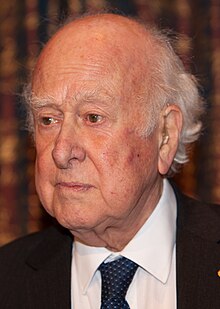
Back بيتر هيغز Arabic پيتر هيڭز ARY بيتر هيجز ARZ Piter Hiqqs Azerbaijani پیتر هیگز AZB Пітэр Хігс Byelorussian Питър Хигс Bulgarian পিটার হিগস Bengali/Bangla Peter Higgs BS Peter Higgs Catalan
Peter Higgs | |
|---|---|
 Higgs in 2013 | |
| Born | Peter Ware Higgs 29 May 1929 Newcastle upon Tyne, England |
| Died | 8 April 2024 (aged 94) Edinburgh, Scotland |
| Alma mater | King's College London (BSc, MSc, PhD) |
| Known for | |
| Spouse |
Jody Williamson
(m. 1963; div. 1972) |
| Children | 2 |
| Awards |
|
| Scientific career | |
| Fields | Theoretical physics |
| Institutions |
|
| Thesis | Some problems in the theory of molecular vibrations (1954) |
| Doctoral advisors | Charles Coulson[1][2] Christopher Longuet-Higgins[1][3] |
| Doctoral students | |
| Website | www |
| Signature | |
Peter Ware Higgs CH FRS FRSE HonFInstP (29 May 1929 – 8 April 2024) was a British theoretical physicist, professor at the University of Edinburgh,[7][8] and Nobel laureate in Physics for his work on the mass of subatomic particles.[9][10]
In 1964, Higgs was the single author of one of the three milestone papers published in Physical Review Letters (PRL) that proposed that spontaneous symmetry breaking in electroweak theory could explain the origin of mass of elementary particles in general and of the W and Z bosons in particular. This Higgs mechanism predicted the existence of a new particle, the Higgs boson, the detection of which became one of the great goals of physics.[11][12] In 2012, CERN announced the discovery of the Higgs boson at the Large Hadron Collider.[13] The Higgs mechanism is generally accepted as an important ingredient in the Standard Model of particle physics, without which certain particles would have no mass.[14]
For this work, Higgs received the Nobel Prize in Physics which he shared with François Englert in 2013.[15]
- ^ a b Cite error: The named reference
higgsphdwas invoked but never defined (see the help page). - ^ a b Peter Higgs at the Mathematics Genealogy Project
- ^ "Peter Ware Higgs CH DSc PhD MSc BSc FRS FRSE FInstP". ph.ed.ac.uk. Archived from the original on 14 October 2013.
initially under the supervision of Charles Coulson and subsequently Christopher Longuet-Higgins
- ^ Bowder, Bill (10 April 2008). "Search begins for 'God particle'". Church Times. Archived from the original on 9 April 2024. Retrieved 9 April 2024.
Dr Lewis Ryder, (...), who was supervised by Professor Higgs,
- ^ "Lewis Ryder". Mathematics Genealogy Project. Archived from the original on 1 April 2023. Retrieved 9 April 2024.
- ^ "Professor Christopher Bishop elected Fellow of the Royal Society of Edinburgh". University of Edinburgh School of Informatics. Archived from the original on 19 October 2022. Retrieved 8 September 2020.
- ^ Griggs, Jessica (Summer 2008) The Missing Piece Archived 20 December 2016 at the Wayback Machine Edit the University of Edinburgh Alumni Magazine, p. 17
- ^ Overbye, Dennis (15 September 2014). "A Discoverer as Elusive as His Particle". New York Times. Archived from the original on 15 September 2014. Retrieved 15 September 2014.
- ^ Overbye, Dennis. A Pioneer as Elusive as His Particle Archived 23 July 2016 at the Wayback Machine, The New York Times website, 15 September 2014. Also published in print on 16 September 2014, on page D1 of the New York edition.
- ^ Blum, Deborah (15 July 2022). "The Recluse Who Confronted the Mystery of the Universe – Frank Close's "Elusive" looks at the life and work of the man who changed our ideas about the basis of matter". The New York Times. Archived from the original on 25 September 2022. Retrieved 25 September 2022.
- ^ Griffiths, Martin (1 May 2007). "The tale of the blogs' boson". Physics World. Archived from the original on 6 August 2020. Retrieved 5 March 2020.
- ^ Fermilab Today (16 June 2005) Fermilab Results of the Week. Top Quarks are Higgs' best Friend Archived 21 September 2008 at the Wayback Machine Retrieved on 27 May 2008
- ^ Cite error: The named reference
BBC-04Jul12was invoked but never defined (see the help page). - ^ Rincon, Paul (10 March 2004) Fermilab 'God Particle' may have been seen Archived 19 July 2008 at the Wayback Machine Retrieved on 27 May 2008
- ^ Amos, Jonathan (8 October 2013) Higgs: Five decades of noble endeavour Archived 11 June 2016 at the Wayback Machine BBC News Science and Environment; retrieved 8 October 2013
© MMXXIII Rich X Search. We shall prevail. All rights reserved. Rich X Search